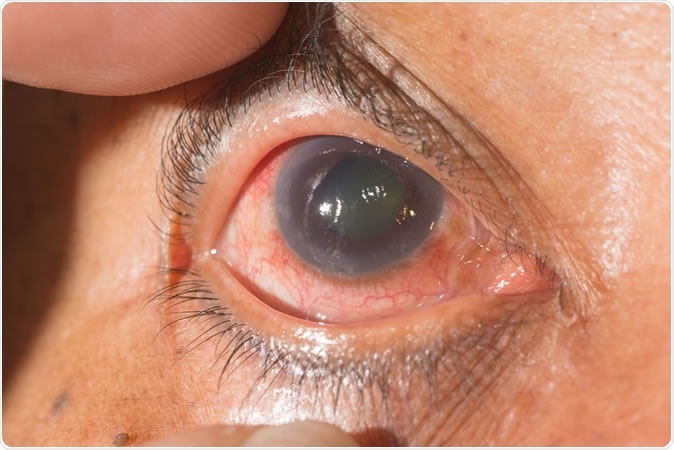The more polluted the air, the higher the risk is that those who live in that area will develop glaucoma, says an interesting new study from the UK, published today in the journal Investigative Ophthalmology and Visual Science. The researchers found that when the amount of fine particulate matter (FPM, particles 2.5 microns or less in diameter, also called PM 2.5) was higher, the rate of self-reported glaucoma was increased by at least 6%, in contrast to the areas with the least air pollution.
The report underlines the need to reduce air pollution by all possible means to improve eye health, in addition to the numerous other health conditions associated with it.

Close up of the neo vascular glaucoma during eye examination. Image credit: ARZTSAMUI / Shutterstock
Glaucoma
Glaucoma is a condition in which the eye develops hypertension in isolation. This puts pressure on the nerve running from the eye, the optic nerve, and typically leads to blindness or severely restricted vision. This illness is the Number 1 cause of permanent blindness the world over and has claimed 60 million victims so far. The most common reason for the increase in pressure is fluid in the eye. Since the optic nerve connects the eyes, and thus the visual sensation, to the brain, loss of function of this nerve cuts off vision.
The symptoms of glaucoma include a very slow reduction in vision, typically beginning from the side of the visual field. The visual field is the amount of the surroundings that can be seen with one eye focused straight ahead. The arrangement of nerve fibers from the light-sensitive retina within the optic nerve is responsible for the fading of vision from the periphery to the center, the latter occurring at an advanced stage.
The reasons for glaucoma vary from elderly age to genetic risk factors, most of which are non-modifiable. The most common type of glaucoma is open-angle glaucoma – the angle refers to the part of the eye where the drainage ducts are located for the fluid constantly produced by the eye tissues. Glaucoma is both insidious in onset and incurable – the best we can hope for is to arrest its progression. Researcher Paul Foster says, “It’s promising that we may have now identified a second risk factor for glaucoma, after eye pressure, that can be modified by lifestyle, treatment or policy changes.
Air pollution
Air pollution with PM2.5 is already known to be associated with a higher risk of lung disease as well as cardiovascular disease. These fine particles can cause shortness of breath, irritation of the eye, nose and throat, coughing and constriction of the airways, as well as even asthma attacks. Heart attacks and poor heart function are also known. Conditions such as Alzheimer’s disease, Parkinson’s disease and stroke, which are due to brain damage, is also higher in such areas. Urban dwellers have a 50% higher risk of glaucoma compared to those in rural areas, and this study helps to show that one reason for this may be the increased air pollution.
The study
The study is based on over 110 000 people whose data is stored in the large UK Biobank database. The participants had undergone eye testing between 2006 and 2010, all over the UK. They reported glaucoma, if present, and also had measurements of the intraocular pressure (the pressure within the eye). In addition, they had spectral-domain optical coherence tomography imaging where the thickness of the macula of the eye is measured.
The researchers also looked at air pollution measures for the locations from which the participants came, drawing on the data from the Small Area Health Statistics Unit. In particular, the researchers looked at PM2.5.
The findings
The study found that in the 25% of geographical areas where air pollution was highest, the rate of glaucoma reported by the people was 6% or more higher than in the least polluted areas. In addition, retinal thickness was likely to be thinner to a significant degree in such areas. This is a change that is typical of glaucoma. However, there was no difference in the pressure within the eye in either case.
The lack of association between eye pressure and air pollution may mean that the effect of air pollution on the eyes is mediated by some other pathway than causing an increase in air pressure. For instance, researcher Sharon Chua says, “Air pollution may be contributing to glaucoma due to the constriction of blood vessels, which ties into air pollution’s links to an increased risk of heart problems. Another possibility is that particulates may have a direct toxic effect damaging the nervous system and contributing to inflammation.
Implications
The observational study cannot prove that glaucoma is caused by air pollution, but it shows “a striking correlation between particulate matter exposure and glaucoma”. The fact that this study, carried out in the UK which has less pollution than many other regions of the world, should draw attention to the possibility that elsewhere in the world, the effect of air pollution on glaucoma rates may be still higher. Moreover, the current study did not consider exposure to indoor air pollution or workplace air pollution, which may contribute to a still higher effect than the 6% risk recorded here.
The researchers say, “We hope to continue our research to determine whether air pollution does indeed cause glaucoma, and to find out if there are any avoidance strategies that could help people reduce their exposure to air pollution to mitigate the health risks.”
Journal reference:
Sharon Y. L. Chua, Anthony P. Khawaja, James Morgan, Nicholas Strouthidis, Charles Reisman, Andrew D. Dick, Peng T. Khaw, Praveen J. Patel, Paul J. Foster, for the UK Biobank Eye and Vision Consortium; The Relationship Between Ambient Atmospheric Fine Particulate Matter (PM2.5) and Glaucoma in a Large Community Cohort. Invest. Ophthalmol. Vis. Sci. 2019;60(14):4915-4923. doi: https://doi.org/10.1167/iovs.19-28346.